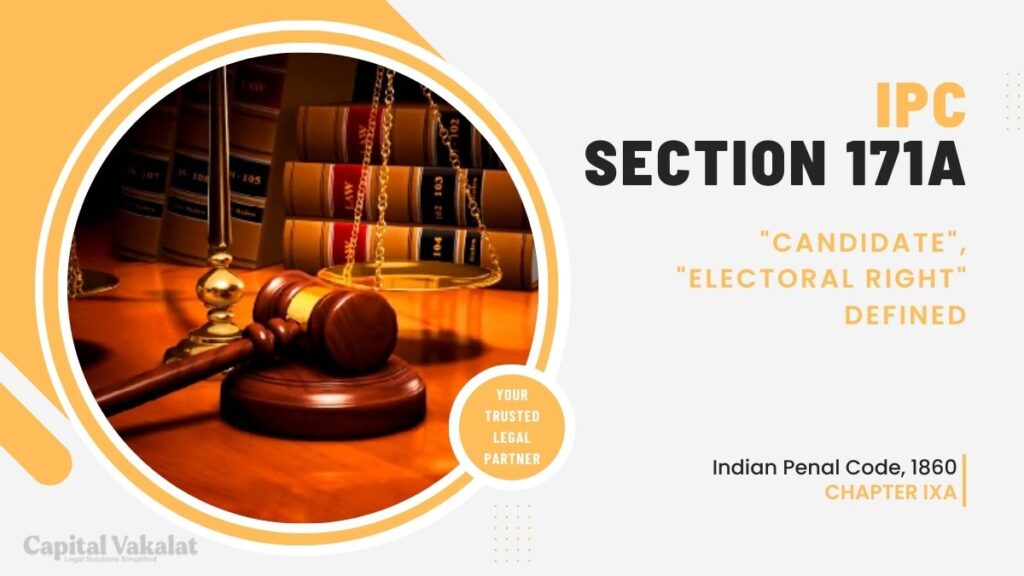In a thriving democracy, the functioning of electoral processes plays a pivotal role in ensuring the voice of the people is heard. To uphold the principles of democracy and maintain the integrity of elections, legal frameworks are put in place. Section 171A of the Indian Penal Code (IPC) is one such essential provision that defines the terms “Candidate” and “Electoral right.”

In this article, we will delve into the significance, implications, and various aspects of Section 171A IPC.
Historical Background
Section 171A IPC, which deals with the definitions of “Candidate” and “Electoral right,” was introduced in the IPC in 1951. The main objective was to prevent and punish corrupt practices in the electoral process and ensure that elections are free and fair.
Understanding the Term “Candidate”
A candidate, as per Section 171A IPC, is defined as a person who has been nominated as a candidate to stand for election. This includes candidates for legislative bodies like the Parliament, State Assemblies, and local government bodies.
Defining Electoral Rights
Electoral rights, on the other hand, encompass the rights of a person to stand for election and to vote in the election. These rights are crucial for the functioning of a democracy as they allow citizens to participate in the decision-making process.
The Significance of Section 171A IPC
This section is of utmost importance as it sets the legal framework for ensuring that candidates meet the eligibility criteria and adhere to ethical standards during elections. It acts as a deterrent against corrupt practices that could compromise the integrity of the electoral process.
Role of the Election Commission
The Election Commission of India plays a pivotal role in implementing and upholding Section 171A IPC. It oversees the conduct of elections and ensures that candidates meet the stipulated criteria and adhere to the code of conduct.
Offenses under Section 171A IPC
Section 171A lists various offenses, such as providing false information in nomination papers, bribery, impersonation, and more. Violating these provisions can lead to severe consequences, including disqualification as a candidate.
Punishments and Penalties
The penalties for violating Section 171A IPC can range from fines to imprisonment, depending on the nature and severity of the offense. These penalties are essential to deter individuals from engaging in corrupt electoral practices.
Legal Precedents
Over the years, various legal precedents have shaped the interpretation and implementation of Section 171A IPC. These cases have further clarified the scope and application of this provision.
Importance of Fair Elections
Fair elections are the cornerstone of any democracy. Section 171A IPC ensures that the electoral process remains transparent and democratic, upholding the principles of free and fair elections.
The Impact of Section 171A IPC
The impact of this section is far-reaching, as it deters individuals from indulging in corrupt electoral practices and safeguards the democratic ideals of the nation.
Safeguarding Democracy
Section 171A IPC is instrumental in safeguarding democracy by maintaining the integrity of the electoral process. It ensures that individuals with the right qualifications and ethical standards participate in elections.
Challenges and Controversies
While Section 171A IPC serves an important purpose, it has not been without its share of challenges and controversies. The interpretation of its provisions and their application have sometimes led to legal disputes.
Conclusion
In conclusion, Section 171A IPC plays a vital role in defining the terms “Candidate” and “Electoral right.” It sets the legal framework for ethical conduct during elections, ensuring that the democratic process remains transparent and fair.
Frequently Asked Questions
What is the role of the Election Commission in implementing Section 171A IPC?
The Election Commission oversees the conduct of elections and ensures that candidates meet the stipulated criteria and adhere to the code of conduct as per Section 171A IPC.
What are the penalties for violating Section 171A IPC?
Penalties for violating Section 171A IPC can range from fines to imprisonment, depending on the nature and severity of the offense.
How does Section 171A IPC contribute to safeguarding democracy?
Section 171A IPC safeguards democracy by maintaining the integrity of the electoral process and ensuring that individuals with the right qualifications and ethical standards participate in elections.
Are there any ongoing controversies related to Section 171A IPC?
Yes, there have been controversies and legal disputes related to the interpretation and application of Section 171A IPC over the years.